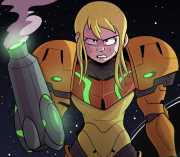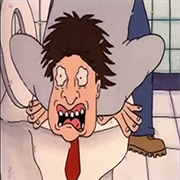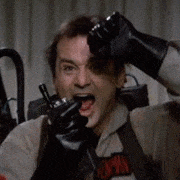|
Since the Kevin Smith thread has talked about it before, I decided to make a discussion thread for Quentin Tarantino. I also decided to extend it to Robert Rodriguez, since they are both quite similar in style, mixing dark comedy with violence, they both came from the same era of filmmaking, and also are pretty good friends in real life. They also made Grindhouse together, so I figured, why not? Although Tarantino's career has mostly stayed stable over the years, Rodriguez has moved into kids movies from time to time with stuff like the Spy Kids movies, which definitely aren't as good as his more "adult" work. Still, I love both of their works. I really love Pulp Fiction, Kill Bill, and Django Unchained, and El Mariachi is my favorite film of all time. Despite being made for only $7,000 and having a very small crew (Robert Rodriguez did the cinematography, editing and sound editing, grip work, and a bunch of other positions in addition to writing and directing), the film is extremely well made. It's a great action movie, and it went on to be a trilogy of great action movies, along with Desperado and Once Upon a Time in Mexico. I'd also recommend Robert Rodriguez's Rebel Without a Crew, ...which as a look into the production of El Mariachi, including how Rodriguez funded the movie through selling his body to science. The book was what got me really interested in film, and inspired me to be a filmmaker myself. I recommend it to anyone who wants to be a filmmaker, its a great read.
|
|
|
|

|
| # ? May 24, 2024 21:16 |
|
I maintain that Tarantino made his best film in the 1990s (Reservor Dogs, Pulp Fiction, and Jackie Brown) and everything else he's done since has been unserious pastiches that have the stench of a director merely playing around rather than the excitement of an artist being daring and capturing the zeitgeist.
|
|
|
|
Mr. Hand posted:I maintain that Tarantino made his best film in the 1990s (Reservor Dogs, Pulp Fiction, and Jackie Brown) and everything else he's done since has been unserious pastiches that have the stench of a director merely playing around rather than the excitement of an artist being daring and capturing the zeitgeist. Yeah, but I prefer fun Tarantino. I'll take his more recent output over his older stuff.
|
|
|
|
I actually kind of agree with that. It's weird, I prefer the newer stuff from Tarantino, and have the opposite reaction with Rodriguez's works. His old stuff is the stuff I like the most.
|
|
|
|
Rodriguez has lost whatever magic he has early in his career
|
|
|
|
Yaws posted:Yeah, but I prefer fun Tarantino. I'll take his more recent output over his older stuff. What about Reservoir Dogs, Pulp Fiction and Jackie Brown is un-fun? Indeed, they are the among the most "fun" movies of the 90s. Did you even watch these movies?
|
|
|
|
It's been a while since I've seen Reservoir Dogs, but Pulp Fiction is as much an "unserious pastiche" as anything he's done after the 90's. It's arguably LESS serious than Inglourious Basterds and Django Unchained are.
|
|
|
|
Yaws posted:Rodriguez has lost whatever magic he has early in his career I still like Machete, but Sin City 2 has a lot of the problems that Frank Miller has now. And of course, I don't need to bring up the new Spy Kids stuff.
|
|
|
|
Mr. Hand posted:What about Reservoir Dogs, Pulp Fiction and Jackie Brown is un-fun? Yes, I have seen them. I like them quite a bit but prefer the over the top violence and humor in his later stuff. His directing has improved since 1997. Yaws fucked around with this message at 23:49 on Jun 7, 2015 |
|
|
|
Raxivace posted:It's been a while since I've seen Reservoir Dogs, but Pulp Fiction is as much an "unserious pastiche" as anything he's done after the 90's. I disagree. The characters and stories of "Pulp Fiction" feel as if they're grounded in reality . The film unfolds before our eyes a series of funny and tragic tales whose content is seemingly cemented in the real world rather than in the masturbatory cinematic obsessions of one Quentin Tarantino. In "Pulp Fiction," Tarantino uses his cinematic skills to relate good stories in impeccable style. In his post-90s films, all Tarantino gives us is style bereft of substance. And I do think that style can sometimes be substance, which is why I have revisited scenes from these pastiches endlessly on youtube. Nonetheless, I remain firm in my conviction that Tarantino is above youtube.
|
|
|
|
Raxivace posted:It's been a while since I've seen Reservoir Dogs, but Pulp Fiction is as much an "unserious pastiche" as anything he's done after the 90's. Yup. Django Unchained and Inglorious Basterds represent QT dealing directly with the very real horrors of chattel slavery and war respectively. Pulp Fiction, while fantastic, never elevates itself to confront anything other than the trials and tribulations of a bunch of low rent criminals. It's fun but I like to think Tarantino has moved on from that sort of trite stuff.
|
|
|
|
I'm still a big fan of them both, they get a lot of flack online (especially Rodriguez), but I think it's undeserved. All personal taste and whatnot, but Rodriguez seems to get hated on more than most directors. Then again, I'm thinking of Aintitcool talkbacks and IMDb. I'm really looking forward to Machete Kills In Space, that style of comedy action RR does appeals to me quite a bit. And QT, well, he's one of the best voices in cinema as far as I'm concerned. If Inglourious Basterds and Django are a dip, that's a dip still well above the majority of films coming out. He's a master of character and dialogue, and I like his style. Very high expectations for Hateful Eight. That said, for me I don't think he can top Pulp Fiction.
|
|
|
|
Mr. Hand posted:I disagree. The characters and stories of "Pulp Fiction" feel as if they're grounded in reality . It is like the posterchild of postmodern filmmaking for goodness sake! Y Kant Ozma Diet posted:Yup. Django Unchained and Inglorious Basterds represent QT dealing directly with the very real horrors of chattel slavery and war respectively. Pulp Fiction, while fantastic, never elevates itself to confront anything other than the trials and tribulations of a bunch of low rent criminals. It's fun but I like to think Tarantino has moved on from that sort of trite stuff. Raxivace fucked around with this message at 00:08 on Jun 8, 2015 |
|
|
|
Heavy Metal posted:I'm still a big fan of them both, they get a lot of flack online (especially Rodriguez), but I think it's undeserved. All personal taste and whatnot, but Rodriguez seems to get hated on more than most directors. Then again, I'm thinking of Aintitcool talkbacks and IMDb. I had no idea the next Machete was going to be in space, but now that I know this, I could not be any more excited for it.
|
|
|
|
I'm going to say something very bold in that Inglorious Basterds is my favorite Tarantino film and I would rank it above Pulp Fiction. It's mostly because of Christoph Waltz's performance but I found the usage of language/accents combined with Tarantino's focus on dialogue made the film a LOT deeper than it should have been. It's a film that I can rewatch again and again and pick up little details that I missed and laugh at the dark jokes I didn't get before. Robert Rodriguez I fear has become complacent and just makes self-aware grindhousey movies like his audience expects. It started with Machete and just got worse from there. Sin City 2 was an abomination (I loved Sin City and re-read the graphic novels almost every year) but it's difficult to tell where Rodriguez's problems end and Frank Millers begin but then I remember Machete Kills which just bored me. Now I need to rant on Sin City 2 for a bit because that film just bothered me. It started with Frank Miller wanting to write new stories, then he fell in love with directing and made The Spirit (bad, bad movie) and dragged his feet for a good decade THEN we got the sequel which was a total mess.
|
|
|
|
Raxivace posted:Okay dude, you lost me when you tried to say Pulp Fiction, a movie that is about referencing all kinds of films, referencing general pop-culture, breaking the fourth wall, detached ironic comedy, and employing nonlinear storytelling is "grounded in reality".
|
|
|
|
Justin Godscock posted:I'm going to say something very bold in that Inglorious Basterds is my favorite Tarantino film and I would rank it above Pulp Fiction. It's mostly because of Christoph Waltz's performance but I found the usage of language/accents combined with Tarantino's focus on dialogue made the film a LOT deeper than it should have been. It's a film that I can rewatch again and again and pick up little details that I missed and laugh at the dark jokes I didn't get before. I'd generally agree, I think Tarantino has grown as a filmmaker but Rodriguez just sorta stayed the same. I find the idea that they belong in the same thread is almost insulting to Tarantino.
|
|
|
|
Y Kant Ozma Diet posted:Yup. Django Unchained and Inglorious Basterds represent QT dealing directly with the very real horrors of chattel slavery and war respectively. Pulp Fiction, while fantastic, never elevates itself to confront anything other than the trials and tribulations of a bunch of low rent criminals. It's fun but I like to think Tarantino has moved on from that sort of trite stuff. All Tarantino does is use World War II and pre-civil war U.S South as settings for cinematic forms he wants to explore. It's not so much that these settings are being legitimately explored but that Tarantino intended them to lend a substantive grounding to cinematic forms that imprinted on Tarantino's mind as a youngster and which he wanted to explore in a "this is a merely an artistic exercise" fashion. It's as if Tarantino feared that, without a Serious Subject Matter grounding, critics and audiences would realize his efforts as the mere masturbatory pastiches they were and proceed to judge them accordingly.
|
|
|
|
Pulp Fiction isn't so much ironically detached as it is about a bunch of criminals who are so complacent in what they do because they've been doing it for so long that the dark comedy is the fact two hitman have a conversation about cheeseburgers and foot massages because "getting into character" before they massacre a bunch of kids to get a briefcase back involving a deal that went bad. It's why Vincent comes off as a terrible hitman because he really has become complacent where he leaves an Uzi lying on Butch's kitchen counter because he has to poo poo (Jules' reasoning for retiring, in my argument, is because he realized he was complacent he was for not clearing the bathroom and nearly getting murdered for it).
|
|
|
|
I put them together because they have a very similar background, having come into the mainstream around the same point, and with very similar film styles. I mean, Tarantino and Rodriguez have collaborated with each other since Four Rooms, and Tarantino always cameos in Rodriguez's movies, so I felt it'd be ok to put them together. and while Tarantino is better in terms of evolving as a filmmaker, I still love Rodriguez's style, and he made some of my favorite movies, so I tend to not be as harsh with him as a lot of people seem to be nowadays. Also Sin City 2 is completely on Frank Miller. Frank Miller is quite crazy nowadays, and everything he touches turns sexist/racist/terrible.
|
|
|
|
Thundersword238 posted:Also Sin City 2 is completely on Frank Miller. Frank Miller is quite crazy nowadays, and everything he touches turns sexist/racist/terrible. He was someone who was mildly conservative (or at least knew when to turn it off) but 9/11 broke him because everything he's done afterwards is absolutely batshit crazy and filled with the worst stereotypical conservative views you can think of (Sin City 2 was so loving sexist at times and not in an ironically over the top way like the graphic novels were).
|
|
|
|
My favourite Tarantino film is Jackie Brown so the argument that he revels in unreality in his later works isn't exactly a newsflash, but I don't buy that his films are worse for it. Also the argument that he only puts serious subjects into his films to deflect criticism is entirely without merit. Often those films exist in the manner they do entirely because he wants to explore that subject in an unreal manner. That's the entire conceit. The settings of stuff like Inglorious Basterds or Django Unchained are as much about form as they are about story and subject matter. They're films about catharsis, there's a satisfaction in the violence because it provides a place to explore the darker side of progressivism, the need to violently kill your oppressors.
|
|
|
|
Justin Godscock posted:He was someone who was mildly conservative (or at least knew when to turn it off) but 9/11 broke him because everything he's done afterwards is absolutely batshit crazy and filled with the worst stereotypical conservative views you can think of (Sin City 2 was so loving sexist at times and not in an ironically over the top way like the graphic novels were). Yeah, it almost makes me not want to even look at my copy of The Dark Knight Returns anymore. Holy Terror in particular was ghastly on all levels.
|
|
|
|
Mr. Hand posted:All Tarantino does is use World War II and pre-civil war U.S South as settings for cinematic forms he wants to explore. It's not so much that these settings are being legitimately explored but that Tarantino intended them to lend a substantive grounding to cinematic forms that imprinted on Tarantino's mind as a youngster and which he wanted to explore in a "this is a merely an artistic exercise" fashion. It's as if Tarantino feared that, without a Serious Subject Matter grounding, critics and audiences would realize his efforts as the mere masturbatory pastiches they were and proceed to judge them accordingly. Even is any of this were true (and it's not) Tarantino directs the hell out of his films and get's amazing performances out of his actors. All of his films are incredibly engaging both on a visual level and and an emotional one (especially his later work). Having the balls to set an exploitation movie in the slavery era south is something young QT probably wouldn't do.
|
|
|
|
Heavy Metal posted:The comedy is mostly characters having differences of opinion with memorable conversations isn't it? Marvin's death and Wallace getting raped (Meaning that he does "look like a bitch") seem to me to be played for comedy.
|
|
|
|
Mr. Hand posted:All Tarantino does is use World War II and pre-civil war U.S South as settings for cinematic forms he wants to explore. It's not so much that these settings are being legitimately explored but that Tarantino intended them to lend a substantive grounding to cinematic forms that imprinted on Tarantino's mind as a youngster and which he wanted to explore in a "this is a merely an artistic exercise" fashion. It's as if Tarantino feared that, without a Serious Subject Matter grounding, critics and audiences would realize his efforts as the mere masturbatory pastiches they were and proceed to judge them accordingly. I see people saying Inglourious Basterds is a ripoff of The Dirty Dozen for example. But it isn't really much like The Dirty Dozen, it's a dialogue driven movie. It's not men on a mission war movie at all really. Or people say Reservoir Dogs is a ripoff of City on Fire, even though an undercover cop and a jewel heist are not exactly what make Reservoir Dogs stand out. As for masturbatory, for my taste something like say Inland Empire might be there, or at least self-indulgent. Lynch is one of my favorite directors in general, but I don't think he made that with the audience in mind. Tarantino I do think looks to entertain and keep the audience engaged, so I don't really think saying his movies are masturbatory makes sense. He makes movies he wants to make, not everybody has to dig it, but these kind of personal criticisms he gets are a bit over the top. Justin Godscock posted:He was someone who was mildly conservative (or at least knew when to turn it off) but 9/11 broke him because everything he's done afterwards is absolutely batshit crazy and filled with the worst stereotypical conservative views you can think of (Sin City 2 was so loving sexist at times and not in an ironically over the top way like the graphic novels were). Raxivace posted:Marvin's death and Wallace getting raped (Meaning that he does "look like a bitch") seem to me to be played for comedy. I know Breathless for example is considered a postermodern film. I think Tarantino even with his stylistic quirks and whatnot does largely tell earnest stories that aren't really intended to be detached or anything, at least that's how it comes across to me. Heavy Metal fucked around with this message at 00:34 on Jun 8, 2015 |
|
|
|
Y Kant Ozma Diet posted:Even is any of this were true (and it's not) Tarantino directs the hell out of his films and get's amazing performances out of his actors. All of his films are incredibly engaging both on a visual level and and an emotional one (especially his later work). I think the way he directs his actors is one of Tarantino's best strengths. One of the reasons I think Kill Bill works so well when compared to a lot of "kick-rear end women" movies (looking at you, Sucker Punch) is that the Bride always seems legitametly FURIOUS. She really is on a roaring rampage of revenge, and I can buy that she was a skilled assassin who could kill dozens of people by herself.
|
|
|
|
Heavy Metal posted:The Marvin's brains thing is definitely black comedy, but that goes way way back doesn't it? What makes it postmodern or ironic? As for Marcellus, it's weird and the gimp... well maybe the gimp is funny, but largely I don't think that scene is played for comedy. I don't think Zed the rapist is ever played for comedy. But even if it was, weird stuff like that exists in older movies too, just curious what makes it postmodern or ironic? Isn't it just black comedy? In other words the way that I see it is that black comedy in postmodern films may have the characters themselves treat the events without any kind of serious gravitas, whereas older films are more likely to have the characters themselves treat the events seriously even if the the presentation was to simultaneously make us laugh maybe too. So I think it is detached in that sense; movie violence can be cool and funny because it isn't real at all. quote:I know Breathless for example is considered a postermodern film. I think Tarantino even with his stylistic quirks and whatnot does largely tell earnest stories that aren't really intended to be detached or anything, at least that's how it comes across to me. I think Tarantino genuinely loves his stories and characters (One of the many things that may set him apart from Godard's filmmaking), but I think we are meant to see them as stories and characters, not depictions of reality or real people from some other universe that our screen is a portal into. Raxivace fucked around with this message at 01:21 on Jun 8, 2015 |
|
|
|
Raxivace posted:This is a good question, and I've done my best to answer it here. Black comedy in those older films typically didn't have the characters treating events such as accidental murder with levity. An older film might treat Jules and Vince's reaction to Marvin's death as deeply shocking and inducing severe paranoia in them (A la the protagonist in Edgar G. Ulmer's Detour, should you accept his narration as reliable), though Pulp Fiction plays on our expectations by having the characters treat a kid's death as if they merely spilled some soda in the car or something. It's a problem that needs to be overcome, though they're clearly not torn up about it on any kind of personal level. Same thing with the rape. Wallace seems relatively unaffected, even though he is obviously a little upset after the fact. Combine this with how the movie heavily places itself in reference to other films and film genre (Especially crime), and yeah, it's postmodern all around. Stuff like say Funny Games, where the intention to mock the genre and audience and whatnot is very clear, that's what comes across as detached or ironic to me. Pulp Fiction is drama, comedy, crime thriller, suspense, a bit of everything, a unique mix for sure. On the older movies with black comedy thing, there's always The Trouble With Harry. People treat death very lightly in a way that doesn't reflect reality in that one. And while we're definitely more likely to see a guy get raped in a 90s movie than a 40s movie, is Marcellus taking that relatively stoically not in the same wheelhouse as the protagonist in Sunset Blvd and his circumstances? Just seems interesting that this kind of unusual dark comedy and casual approach to shocking things is considered inherently ironic. I guess it's ironic in that the characters react differently than we're expecting? I don't think it's ironically detached so much though, not any more so than most comedies. It's just unique to see that kind of comedy paired with drama and violence in Pulp Fiction I think. Heavy Metal fucked around with this message at 01:28 on Jun 8, 2015 |
|
|
|
You know, I honestly believe that the segments by Rodriguez and Tarantino in Four Rooms are close to criminally underrated - and I will say right now that the segments by Alison Anders and Alexandre are mediocre at best and both made watchable only by Tim Roth's fantastic physical comedy and surprisingly effective mugging. But it sucks because the Anders/Rockwell segments come first and I would blame *nobody* for turning the film off in disgust at some point during either of those segments, because they just aren't that good. However, this does NOT apply to the two segments by Rodriguez and Tarantino! The third segment, directed by Rodriguez, is called "The Misbehaviors" and is actually a sort of amazing little early hybrid of what I'd consider his "adult" and his later "kids" work in film. "The Misbehaviors" is about a *very* suave and sexy Antonio Banderas paying the bellboy $500 (Tim Roth) to sorta-babysit his children "rather than some pedophile babysitter", and as per the title the kids cause a *great* deal of trouble. The whole segment is just a *fantastic* build-up, but it's also full of hilarious physical and verbal comedy, all with pitch-perfect timing. Rodriguez gets *amazing* performances out of his child-actors here - they have to carry the entire segment themselves, practically, and they do so effortlessly. It's impressive, and the whole thing is really fun. I always loved the Tarantino special the best, though, because it's essentially a post-modern adaptation of the Roald Dahl short-story, "The Man From the South". If you're unfamiliar; the story is about a man from the south of England who gets into an involved conversation with another man (who happened to be discussing how much he loved the beautiful car that the man from the south has) and ultimately a bet is proposed - the man from the south bets the other gentleman that if he can light his cigarette lighter 10 times in a row, then he will give that man his car. If he fails to light his cigarette lighter 10 times in a row, the man from the south will chop off one of his fingers - "Just a pinky - you'd barely miss it, right?" Anyway, this story was first adapted into a story on "Alfred Hitchcock Presents" in 1960 called "The Man From Rio", which stars Peter Lorre and Steve McQueen in the two title roles - and is *fantastic*. I beleive a couple more lesser adaptations were made on similar shows, but obviously none had the same sort of star power of Lorre/McQueen. And then Tarantino does his weird adaptation at the very end of four rooms. I think it works fantastically, and I just *love* poo poo like that. It's like this half hour short film of Quentin Tarantino just TOTALLY indulging himself. It takes place at the end of a raucous New Years Eve party in the penthouse, and Tarantino plays a talanted and hot young director (himself) who just made a huge hit film (Four Rooms was made in 1995) and is doing a similar bet with his friend involving his car, and his friend lighting his lucky zippo 10 times in a row. The big setpiece is this like 10-minute long unbroken shot with Tarantino monologuing at TOP FREAKING SPEED the entire time, taking Tim Roth around the room and introducing himself to everyone and showing off about himself and whatnot. Anyway I've probably rambled enough.. I just love those last two segments of Four Rooms. Maybe it's because I was like a 16-year-old stoner when I first saw it and it seemed like the funniest and cleverest thing ever at the time, and I was a big Tarantino/Tim Roth/Film fan so yeah. I get that it's not a "good" film but man do this two segments have some kinda uniquely fun energy. I also love the brief interlude with Roth talking to a stoner and then Kathy Griffin on the phone. "And then there's me. Walkin' out the door. Buenos Noches."
|
|
|
|
kaworu posted:I always loved the Tarantino special the best, though, because it's essentially a post-modern adaptation of the Roald Dahl short-story, "The Man From the South". If you're unfamiliar; the story is about a man from the south of England who gets into an involved conversation with another man (who happened to be discussing how much he loved the beautiful car that the man from the south has) and ultimately a bet is proposed - the man from the south bets the other gentleman that if he can light his cigarette lighter 10 times in a row, then he will give that man his car. If he fails to light his cigarette lighter 10 times in a row, the man from the south will chop off one of his fingers - "Just a pinky - you'd barely miss it, right?"
|
|
|
|
I need to check out Four Rooms sometime. I typically have had little interest in anthologies by multiple directors like that, though I've heard good things about the Tarantino short for years.Heavy Metal posted:Interesting, that makes sense and maybe I can agree postmodern does apply. I don't find Tarantino's movies to be detached or his characters any less believable than any other stylized worlds I'm immersing myself in for a couple hours personally. While it's stylized and it's funny that these hitmen treat death in such a casual nonchalant way, I don't think the intention is to make them less "real". Take say, The Big Lebowski. Walter is a very larger than life character, his unexpected intense reactions to things are hilarious, including crazy unexpected violence etc. Does The Big Lebowski qualify as ironically detached? Maybe I'm just less inclined to give things that description, I'm usually quick to suspend my disbelief and go along for the ride. A quick Google search shows that several papers have been written on how that movie relates to postmodern filmmaking, though I'm not familiar with any of them directly. People have also accused the Coens of literally hating a lot of their characters, so there's that. quote:On the older movies with black comedy thing, there's always The Trouble With Harry. People treat death very lightly in a way that doesn't reflect reality in that one. quote:And while we're definitely more likely to see a guy get raped in a 90s movie than a 40s movie, is Marcellus taking that relatively stoically not in the same wheelhouse as the protagonist in Sunset Blvd and his circumstances? Just seems interesting that this kind of unusual dark comedy and casual approach to shocking things is considered inherently ironic. I guess it's ironic in that the characters react differently than we're expecting? I don't think it's ironically detached so much though, not any more so than most comedies. It's just unique to see that kind of comedy paired with drama and violence in Pulp Fiction I think. I don't know that combining violence and comedy is necessarily new in Pulp Fiction (I've heard people say the same thing about Kurosawa's Yojimbo and Leone's Dollars Trilogy, though I don't know that I agree), but its certainly one of the most popular examples. I think the thing with most comedies is that most of them usually aren't mean-spirited and wanting in inflict permanently harmful violence on characters (Tom never seems to eat and digest Jerry, Jerry never kills Tom permanently), the more slapsticky ones tend to not pretend be representative of the real world, nor do comedies tend to embrace the artificiality of film (See Keaton's Sherlock, Jr. for an excellent exception). On the other hand there's a film like The Great Dictator where Chaplin breaks character at the end to give a speech directly to audiences that decries Nazism and dictatorships. I think the irony generally comes from our expectations based upon what we're used to seeing in more mainstream filmmaking.
|
|
|
|
Heavy Metal posted:He likes to make references and nods to films he loves, and he wears that on his sleeve. But most filmmakers are heavily influenced by and borrow plenty from the films they've seen as well, they just do it in a more subtle way.
|
|
|
|
Slugworth posted:I'm surprised to hear that people accuse him of ripping off other work, when it's always obviously an homage. But that obviousness is the issue. I think he is a great director who consistently hurts his own work by seemingly being compelled to make overt references to other films. The end product is still usually great, but filled with moments where you just sort of feel like "Jesus, ok man, you have an extensive knowledge of film, can we just focus on this one for a minute?" Like even when he references a famous film like Psycho in Pulp Fiction, how many people actually pick up on it, let alone process why he's making the reference?
|
|
|
|
For Tarantino I love everything up to and including"Jackie Brown", which is still my favorite of his movies. After "Jackie Brown" I sort of feel like Tarantino had a sort of "crisis", since it wasn't as widely regarded as his other movies, and I truly feel it's the movie he put the most of himself into. I loved Kill Bill at the time, but then as I started to get into 70's Japanese films it actually turned me against Kill Bill, and now I really don't care for either of them. I'd rather throw on "Lady Snowblood" then ever watch "Kill Bill" again. I don't care for "Death Proof", and started to fall into the opinion that QT was a hack and done for. Then "Basterds" came out, and I'd say it's my second favorite of his films, and I'll go along with whatever he's making. Django isn't as good, but if nothing else it's really well crafted. For Rodriquez, he hasn't made anything of worth in over a decade, but he's put out plenty of garbage. Also Rodriguez seems obsessed with making "grindhouse" movies, when he doesn't even understand them at all. zandert33 fucked around with this message at 06:30 on Jun 8, 2015 |
|
|
|
zandert33 posted:I loved Kill Bill at the time, but then as I started to get into 70's Japanese films it actually turned me against Kill Bill, and now I really don't care for either of them. I'd rather throw on "Lady Snowblood" then ever watch "Kill Bill" again. you sound like kind of a douchenozzle, hth
|
|
|
|
I feel that exact same way about Kill Bill. I would much rather watch any of the films it's riffing on.
|
|
|
|
Tarantino and Rodriguez have similar film styles? You're nuts. Tarantino is a film maker, he uses camera, sound and acting as ways to tell the story. Rodriguez had a few neat movies and became utterly full of himself which really isn't deserved. He's a dick to work for, too.
|
|
|
|
HUNDU THE BEAST GOD posted:I feel that exact same way about Kill Bill. I would much rather watch any of the films it's riffing on. Part 2 is for me the much more rewarding experience, which I think is probably by design. I love how it essentially distils everything down to two former lovers sitting down and talking at the end. What I don't think has aged all that well is Thurman's performance, which fluctuates wildly. Oh and Basterds is great. Someone once described it as The Dirty Dozen meets Cinema Paradiso and I think it sort of nails it on the head. As far as Rodriguez goes: The Faculty is really underrated.
|
|
|
|

|
| # ? May 24, 2024 21:16 |
|
LORD OF BUTT posted:you sound like kind of a douchenozzle, hth I'm sorry that people who don't like things you like for tangible reasons upsets you so. I never said people were horrible if they liked "Kill Bill", it has no effect on me how anybody feels about anything. For myself I don't feel it does anything better then the movies he copied off that came out 40 years ago, so it has no value to me.
|
|
|


















